Table of Contents
- Home
- »
- Hybrid Content
- »
- Does Google penalize AI content?
-
Whitney Blankenship
- 8 minutes read time
Does Google penalize AI content?
- Home
- »
- Hybrid Content
- »
- Does Google penalize AI content?
Does Google penalize AI content?
Table of Contents
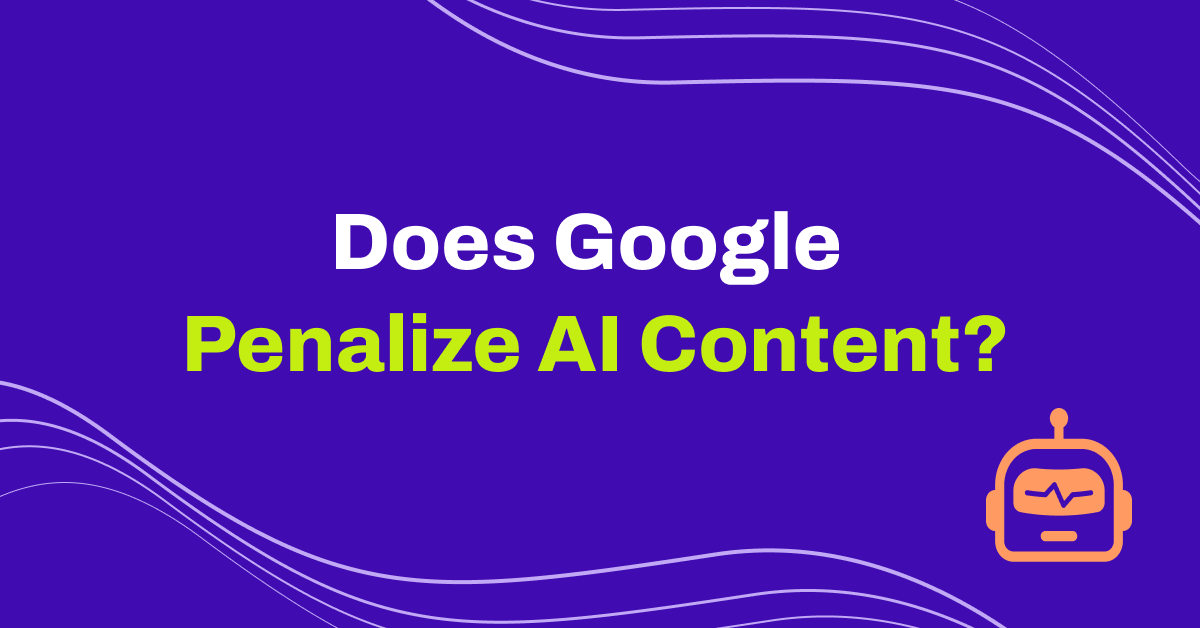
Amidst advancements in AI, content creators stand at a crucial turning point: to harness AI in content creation or to tread cautiously?
There’s an undeniable allure to the efficiency and capabilities of AI. One example is AI’s ability to draft an article in mere minutes, eliminating hours of human effort.
But the burning question is: Does quality get compromised? And even more pressing, does Google penalize AI content?
TL;DR
- Google does not penalize AI content as long as it has been reviewed by an expert.
- Google’s E-E-A-T guidelines indicate that all content should be experience-based, demonstrate expertise, be authoritative, and be trustworthy.
- Quality, relevance, and utility remain paramount for all content. If AI-crafted content is checked for accuracy and integrity and follows Google’s guidelines, it stands to rank well.
- Subject Matter Experts (SMEs) can enhance AI-produced content by adding depth, nuance, brand alignment, narrative cohesion, and ethical considerations. They help in refining AI outputs and providing the human touch.
- Wordbrew’s Hybrid approach combines AI’s efficiency with human insights offers a robust content creation method that aligns with Google’s emphasis on quality and relevance.
The truth about Google’s stance on AI content
Up until a few months ago, Google was clear in its love for human-generated content. However, a lot has changed with the release of the Helpful Content Update of September 2023.
commands a vast domain that connects information to the inquisitive minds of users. However, the soaring ascent of sophisticated AI tools, such as ChatGPT, has given rise to speculation about the future balance of power in the digital search realm.
Google’s stance on content pre-September looked like this:
“Google Search’s helpful content system generates a signal used by our automated ranking systems to better ensure people see original, helpful content written by people, for people, in search results.”
Come September, Google’s stance changed to this:
“Google Search’s helpful content system generates a signal used by our automated ranking systems to better ensure people see original, helpful content created for people in search results.”
There’s a lot to unpack here.
The scrapping of the phrase “written by people” indicates that Google has now started accepting content generated via AI as long as people find it valuable. But that’s not all. Since “helpful content” can be subjective, Google took it upon themselves to provide content marketers and content creators with a set of questions that they can use to evaluate their content.
For instance, to demonstrate expertise on the topic, Google recommends you ask yourself questions like:
“If someone researched the site producing the content, would they come away with an impression that it is well-trusted or widely-recognized as an authority on its topic?”
Or, to ensure your content really is helpful, ask yourself questions like:
“Does your content clearly demonstrate first-hand expertise and a depth of knowledge (for example, expertise that comes from having actually used a product or service, or visiting a place)?”
The truth remains that Google doesn’t see the latest AI models as a threat since it has been intricately weaving natural language processing and AI into its ecosystem for years. An early manifestation of this was when Google’s neural network impressively discerned cat images from unlabeled YouTube clips.

Today, the range of AI’s influence within Google is vast. For instance, it powers language translations for smooth global communication, refines search results for precision, and even aids the Google Assistant in making our daily tasks a tad easier. Not to mention its role in ensuring emails land in the right inboxes or in smartly optimizing ad campaigns.
A more recent groundbreaking application of AI by Google is the Search Generative Experience (SGE). By harnessing the power of generative AI, Google seeks to revolutionize search experiences, providing users with even more personalized and precise answers. This is a testament to Google’s commitment to continuously enhance search, intertwining cutting-edge AI techniques with its foundational promise to users.
That doesn’t, however, mean that all automatically generated content gets a free pass. At its core, Google will always prioritize high quality content that’s helpful and serves user queries as best as possible. How does it do that? Let’s find out.
Inside Google’s algorithms
It’s important to know the purpose of Google’s algorithms to understand their stance on AI content. This vast and complex mechanism underpins how content is evaluated, ranked, and presented to users across the globe. At the heart of this algorithm lies Google’s unwavering commitment to its users—a dedication to delivering content that is not just relevant but also authoritative and of the highest quality.
As Google clearly states in its artificial intelligence content guidelines: “Focusing on rewarding quality content has been core to Google since we began. It continues today, including through our ranking systems designed to surface reliable information and our helpful content system.” This proves that while companies may use artificial intelligence to create content at scale, it’s necessary to ensure that the content isn’t spammy as Google has no respect for low quality content that isn’t helpful to readers.
Let’s take a more in-depth look at some of the pivotal areas that decide how helpful a website and its content are:
User experience (UX)
The user experience of a website is often mistakenly seen as just how visually appealing a website is. In reality, UX goes far beyond that.
When you’re on a new site for the first time, you’re subconsciously making note of a lot of factors including the design elements, ease of navigation, speed, and accessibility. Here’s why each of these matter:
Speed: In today’s click-and-go world, no one likes to watch a spinning wheel. If your site’s dragging its feet, you might lose some impatient visitors. So, make sure your pretty graphics and snazzy videos are just as quick off the mark as your text.
One way of doing so is checking how well your site is performing on websites like GTMetrix and checking the Core Web Vitals report in Google Search Console. Both of these sources will let you know whether you have any elements on your site that are slowing it down along with possible fixes that can help you improve the user experience.
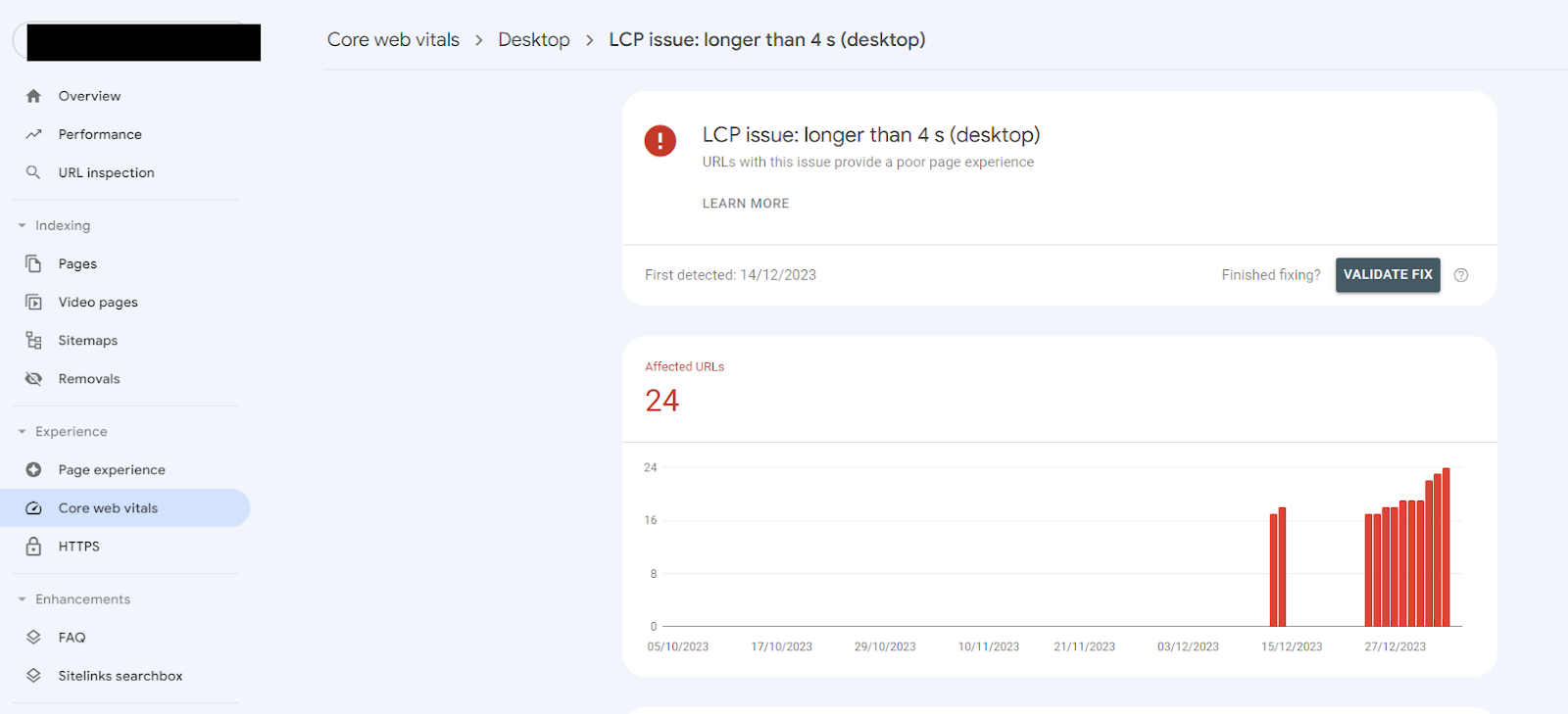
Mobile-friendliness: With nearly everyone glued to their phones these days, Google’s all about a seamless mobile experience. So, your content shouldn’t just look good—it should look amazing on any screen. If readers are squinting and pinching to see your content, it’s time for a tweak.
Keep in mind, as much as 55% of all traffic comes from mobile devices, so it’s crucial to optimize the experience your site offers to mobile users.
Navigability: Think of your site as a city. Every page, a destination. Now, wouldn’t you want smooth roads and clear signs? Making it a breeze for visitors to find their way around isn’t just good manners—it tells Google you care about your visitors and keeps users coming back for more.
Content quality
When it comes to content, it’s not just about quantity—unsurprisingly, it’s the quality that makes the real difference.
- Depth: Don’t just scratch the surface. While a quick read can be handy, Google loves when you dive deep and answer the query as it needs to be answered—that’s right, not as comprehensively as possible.It’s not about word count, but word worth. Rich, thoughtful content stands out, especially when things get technical.
- Accuracy: Google’s like that top student in class, always double-checking facts. Keep your content accurate and fresh. Staying updated isn’t just good practice; it’s a Google must-do. Pssst: Did you know that ChatGPT’s knowledge only stretches back to 2021?
- Relevancy: Ever searched for “beginner yoga poses” and landed on advanced acrobatics? Annoying, right? Google thinks so too, and it will penalize that page based on how quickly you clicked off it to find something easier. Make sure your content vibes with what people are genuinely hunting for, and you’ll be in Google’s good books.
Luckily for marketers and content creators, Google’s search quality evaluator guidelines go in a lot of detail on what is considered to be low-quality content. Not only is it important for the main content (MC) to be aligned with the title of the page, you should also ensure the content is original and accurate.
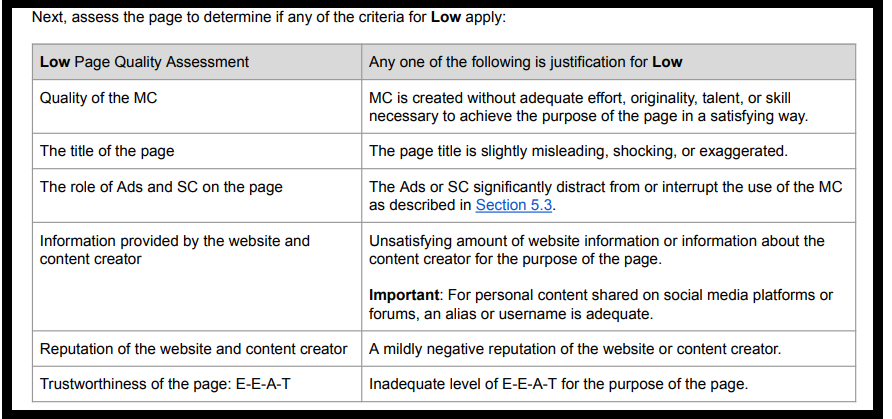
Backlinks
Even though backlinks have been getting a lot of bad press in recent years, they remain extremely important in determining which sites and pages deserve the best ranks.
Think of backlinks as a trust signal on the internet. If you’re getting backlinks from other authoritative and relevant websites, Google’s algorithms see this as a sign that other people will find your content helpful too. As a result, your website is given a push to see whether enough people click on it when it’s higher up in search rankings.
One thing to remember here is that getting high quality backlinks isn’t easy. Often, authoritative website steer clear of being affiliated with other sites that have sub-par content or even adding links to them. This is why most automatically generated content that hasn’t been reviewed by an expert for inaccuracies or quality fails to get any backlinks or rank well in search.
Understanding these foundational aspects primes us for a future where a mix of human and AI content could truly shine. This is something we have pioneered at Wordbrew: the method of marrying the prowess of AI with the nuanced understanding of human expertise, presenting an opportunity to craft content that ticks all these boxes. The end result? An unparalleled user experience, unmatched content depth, and naturally attracting quality backlinks.
EEAT: The deciding factor between good content and low quality content
In the expansive universe of digital content, where the line between genuine expertise and superficial fluff can blur, Google has carved out a distinct metric to evaluate content quality: EEAT.
Standing for Experience, Expertise, Authoritativeness, and Trustworthiness, EEAT isn’t just an acronym; it’s a guiding beacon for content creators. These guidelines stress that the soul of the content lies in its genuine depth, its command over the subject, and the trust it inspires.
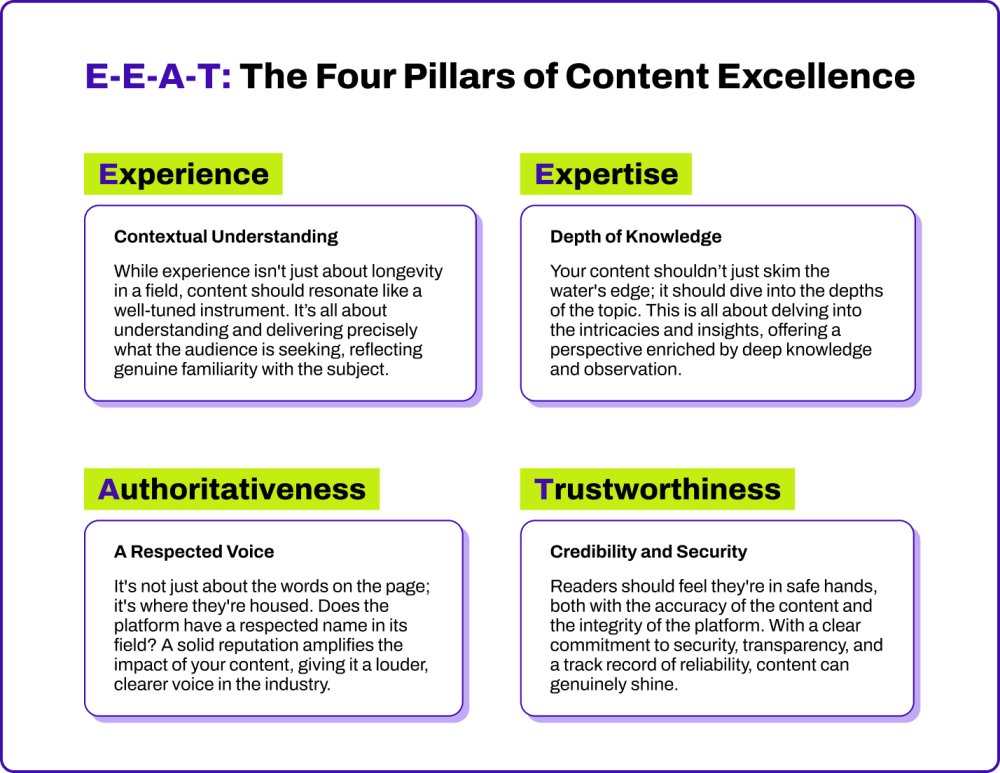
For marketers who are using ai content, it’s imperative to remember that the essence of EEAT lies not in mere content production but in sculpting content that stands tall in terms of experience, expertise, authority, and trust.
Making AI content better with Subject Matter Experts (SMEs)
AI and Subject Matter Experts (SMEs) work in tandem to ensure content is not only accurate but resonates with depth and meaning. SMEs enhance AI’s broad data analysis with specific insights, adding a human touch that includes cultural nuances and emotional connection. This collaboration results in content that is factually sound and emotionally engaging, tailored to the audience’s needs.
Quality control and brand consistency are at the core of our process. While AI efficiently generates content, SMEs refine and validate it to meet high-quality standards. They align the AI-produced material with the brand’s unique voice, ensuring consistency and a strong brand identity. The result is a cohesive and compelling narrative that effectively communicates the brand’s message.
Here at Wordbrew, we employ a process called hybrid content creation which blends the efficiency of AI and the experience of subject matter experts to create on-brand content at scale. Ethical considerations and SEO enhancement are integral to our approach. SMEs address sensitive topics with care, ensuring content is respectful and ethically sound. They also optimize content for SEO, focusing on value and relevance to attract both search engines and real audiences. The continuous feedback loop between AI and SMEs drives improvement and adaptation, keeping the content dynamic and effective.
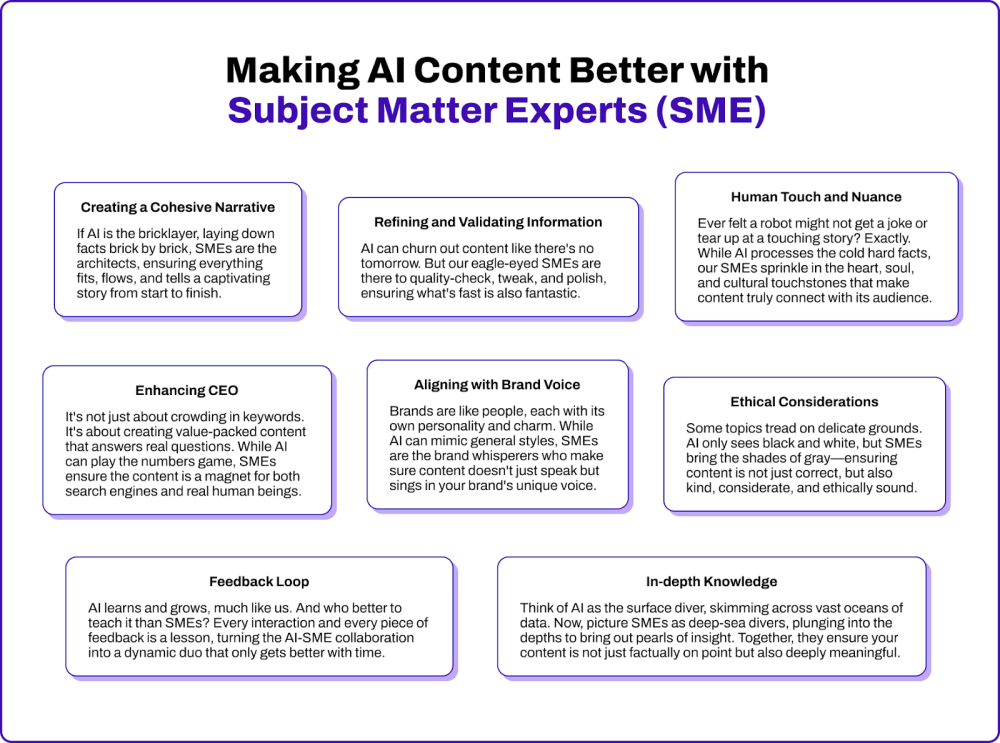
In a nutshell, the combination of AI’s efficiency and the expertise of SMEs provides a blueprint for content that doesn’t just populate the web but truly enriches it. Isn’t it time we harness the power of both to produce content that resonates, informs, and inspires?
Key Takeaway
Here’s the scoop: AI is an amazing tool for churning out content at warp speed. But will Google penalize AI content? Not exactly, but only as long as it still serves purpose and is written keeping Google’s guidelines in mind.
The solution is blending the high-tech power of AI with the real, raw insights of humans. This hybrid approach gives your content a flavor that’s hard to beat. As we venture deeper into the world of AI and human collaboration, remember that it’s the human touch that makes AI content truly shine. So, why not get the best of tech and touch, and watch your content soar in Google’s search rankings?
Ready to give hybrid content creation a shot? Click here to get started today!